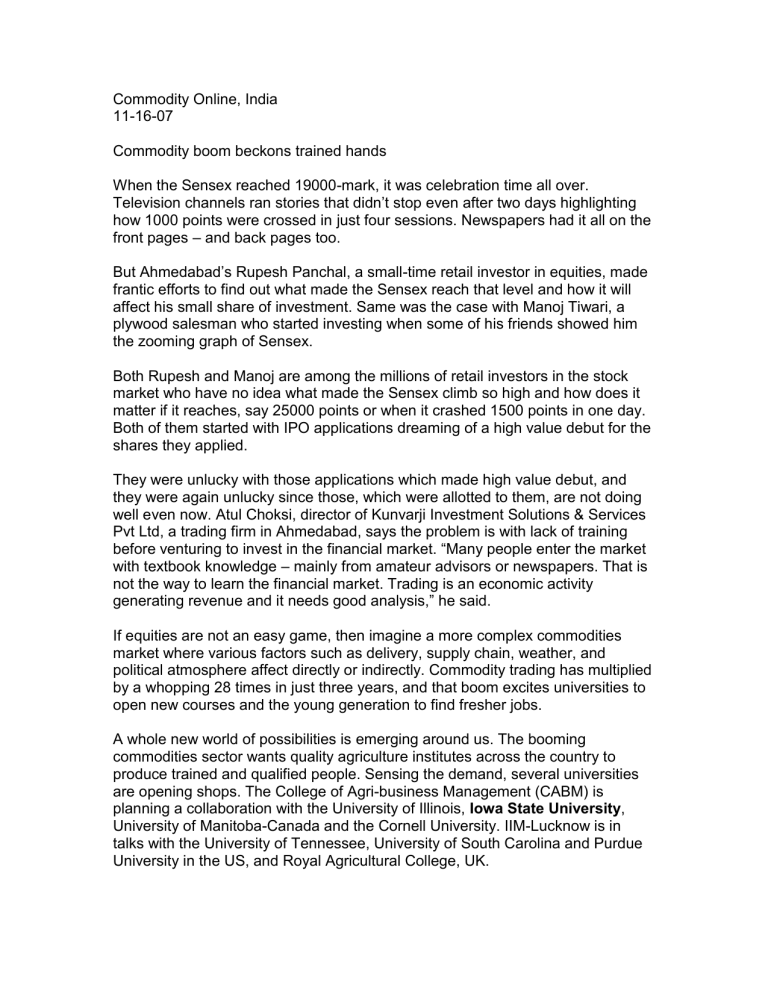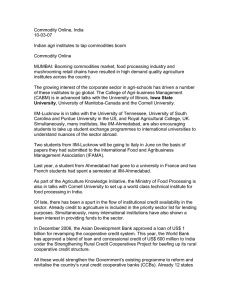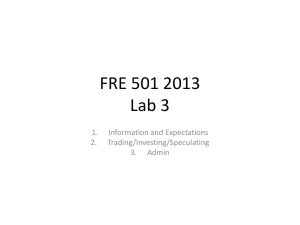Commodity Online, India 11-16-07 Commodity boom beckons trained hands

Commodity Online, India
11-16-07
Commodity boom beckons trained hands
When the Sensex reached 19000-mark, it was celebration time all over.
Television channels ran stories that didn’t stop even after two days highlighting how 1000 points were crossed in just four sessions. Newspapers had it all on the front pages – and back pages too.
But Ahmedabad’s Rupesh Panchal, a small-time retail investor in equities, made frantic efforts to find out what made the Sensex reach that level and how it will affect his small share of investment. Same was the case with Manoj Tiwari, a plywood salesman who started investing when some of his friends showed him the zooming graph of Sensex.
Both Rupesh and Manoj are among the millions of retail investors in the stock market who have no idea what made the Sensex climb so high and how does it matter if it reaches, say 25000 points or when it crashed 1500 points in one day.
Both of them started with IPO applications dreaming of a high value debut for the shares they applied.
They were unlucky with those applications which made high value debut, and they were again unlucky since those, which were allotted to them, are not doing well even now. Atul Choksi, director of Kunvarji Investment Solutions & Services
Pvt Ltd, a trading firm in Ahmedabad, says the problem is with lack of training before venturing to invest in the financial market. “Many people enter the market with textbook knowledge
– mainly from amateur advisors or newspapers. That is not the way to learn the financial market. Trading is an economic activity generating revenue and it needs good analysis,” he said.
If equities are not an easy game, then imagine a more complex commodities market where various factors such as delivery, supply chain, weather, and political atmosphere affect directly or indirectly. Commodity trading has multiplied by a whopping 28 times in just three years, and that boom excites universities to open new courses and the young generation to find fresher jobs.
A whole new world of possibilities is emerging around us. The booming commodities sector wants quality agriculture institutes across the country to produce trained and qualified people. Sensing the demand, several universities are opening shops. The College of Agri-business Management (CABM) is planning a collaboration with the University of Illinois, Iowa State University ,
University of Manitoba-Canada and the Cornell University. IIM-Lucknow is in talks with the University of Tennessee, University of South Carolina and Purdue
University in the US, and Royal Agricultural College, UK.
Besides, many institutes, like IIM-Ahmedabad, are also encouraging students to take up exchange programmes to international universities to understand nuances of the sector abroad. Last year, a student from Ahmedabad had gone to a university in France and two French students had spent a semester at IIM-
Ahmedabad. The ministry of food processing is reportedly discussing with
Cornell University to set up a world class technical institute for food processing in
India.
Simultaneously, many international institutions have also shown a keen interest in providing funds to the sector. In December 2006, the Asian Development Bank approved a loan of $1 billion for revamping the cooperative credit system. The
World Bank has approved a blend of loan and concessional credit of $600 million to India under the strengthening rural credit cooperatives project for beefing up its rural cooperative credit structure. With such credits, the boom is expected to strengthen the government’s existing programme to revitalise the country’s rural credit cooperative banks (CCBs).
Already 12 states have signed an agreement with the Centre and the National
Bank for Agriculture and Rural Development (Nabard) for the rural cooperative credit structure reform programme. The private players are also ready to provide financial assistance. For example, Hatsun Agro Product Ltd has signed up with the State Bank of India (SBI) to provide loans to dairy farmers for a contract farming programme.
The unprecedented boom in commodity trading has also opened up new vistas for wide ranging jobs for skilled manpower. India has some 800 commodity broking houses, agri export and import companies and food processing firms, which are now searching for quality professionals to run their business. Top business schools like IIM-Ahmedabad, Management Development Institute
(MDI), Institute of Management Technology (IMT) have prioritised commodity trading in their syllabus.
The commodity boom would generate staggering vacancies. Each commodity research department attached to brokerage houses would need 15-20 analysts.
Hundreds of MBAs are in demand, not just as analysts with 700-odd commodity brokers, but also at export houses and other agri-based businesses.






